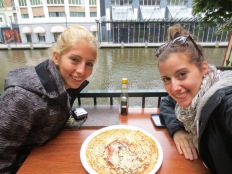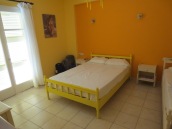




You’re in a beautiful new country full of exciting culture and you’re surrounded by delicious looking food at every corner. European countries have some of the worlds most spectacular cuisine. Everything from French, Italian, Spanish, Swiss, German, etc. You can’t go wrong no matter where you go to eat! Here are a few tips to keep your wallet heavy, and your stomach full.
1. In most tourist zones, restaurants often have a meal deal which includes service, a drink, and usually a combination of an appetizer, entree and dessert. They are usually fairly limited menus, however can be awesome if you are on a tight budget!
I remember doing this often in Ibiza. A glass of wine, salad to start, pasta or chicken dish, and ice cream for dessert all for 6Euro…YESS PLEASE!
2. So you’re standing on the main street in Barcelona, La Rambla, and are looking for a place to eat… here’s where you NEED to go… Off a side road adjacent to La Rambla walk about 1 block down, and turn the corner. Always walk one block down off the main street and look for restaurants there, no matter where you are! There food will be equally as good, if not better than the main places on the strip, and the prices will be half of what you’re paying elsewhere.
3. Stop thinking that you need to eat out for every meal. Guess what, there are real people, in these real cities that you are visiting, and they need to buy groceries too! Head to a grocery store and load up on sandwich supplies for lunch, and granola bars and fruit to keep you going through the day. This is also a great option for do it yourself dinner picnics. There’s nothing like putting together your own charcuterie board, and grabbing a cheap bottle of wine and having a picnic in front of the Eiffel Tower, or Sacré–Coeur. Food in general in Europe is fairly inexpensive (this depends on where you are…) however in mainland Europe – Germany, France, Spain, Italy etc. you’ll be surprised at the prices compared to North America! Also note that food is priced by the Kilo (that’s 2.2 pounds).
4. Grocery stores are also the BEST place to buy water... in small convenience stores they’ll run you up to a Euro per bottled water… In grocery stores you’ll get 2l of water for 20-60 Cents. Share it with a friend and you’re good to go.
5. One of the best things in Europe are the markets. Depending on your location ask around for when and where the best markets are being held. They are often on Saturday or Sunday mornings, and in the main squares, or a busy street of the city. You’ll find everything here from cheese, meets, cultural delicatessen, cultural snacks. They are usually priced extremely well and are a great way to see some local culture!
6. Hostels frown upon this… but we all do it… Grab an extra apple or something small at your free breakfast in the hostel. It’s always nice to have a snack in your bag when you’ve been walking for 8 hours in blistering heat. I’m not saying make yourself 3 sandwiches and cut yourself a fruit salad and more for dessert… but grab a little something just to keep you going… and be discreet about it.
7. Hit up a University Cafeteria. Most large cities have university campuses that are accessible to the public. Take a walk around and visit the university, and stop in for a meal. Since they are catering to students, prices are low, and there are usually pretty decent portions. I had a giant, delicious, make your own salad in Germany for 1.89€.
8. Try some local Street Food. Get out and try some local food. There is street food everywhere, and it’s much cheaper than sitting down at a restaurant.
9. Going to a restaurant – remember the following:
- Depending on where you are, that “Complementary bread” that they place on the table for you they actually charge for.. Ask if its complementary if you’re not sure. If you don’t touch it, you won’t be charged for it.
- In Europe they don’t tip the standard 15-20%. Depending on the type of restaurant round up to the nearest $5 or $10. For exceptional service everyone loves a little extra, however know that it’s not expected of you.
10. I get it, you’re on a budget, but visiting somewhere so rich in culture with amazing cuisines, try to treat yourself here or there. I can’t stress enough that part of experiencing a new culture, includes experiencing their food. Have a night out where you can enjoy a great meal at a great restaurant.
I totally cheaped out in Oslo when I was there and because I was couchsurfing it was easy to make our own meals, it was fantastic! But on our last night there there’s was nothing better than going to a traditional Scandinavian Michelin star restaurant and enjoying a night out of fantastic local cuisine. A lasting memory and experience is worth that extra $50 that you can easily make up for next month at work. 🙂
Guten Appetit! Bon appétit! ¡Buen provecho! Buon appetito! Smaklig måltid! Приятного аппетита! 食福, いただきます,















